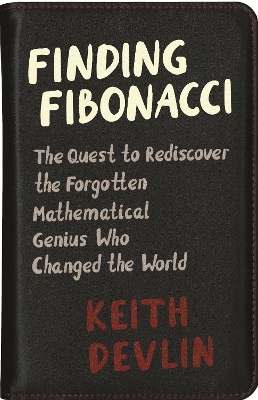
Finding Fibonacci
The Quest to Rediscover the Forgotten Mathematical Genius Who Changed the World
Seiten
2019
Princeton University Press (Verlag)
978-0-691-19230-7 (ISBN)
Princeton University Press (Verlag)
978-0-691-19230-7 (ISBN)
A mathematician's ten-year quest to tell Fibonacci's storyIn 2000, Keith Devlin set out to research the life and legacy of the medieval mathematician Leonardo of Pisa, popularly known as Fibonacci, whose book Liber abbaci, or the "Book of Calculation," introduced modern arithmetic to the Western world. Although most famous for the Fibonacci num
A mathematician’s ten-year quest to tell Fibonacci’s story
In 2000, Keith Devlin set out to research the life and legacy of the medieval mathematician Leonardo of Pisa, popularly known as Fibonacci, whose book Liber abbaci, or the “Book of Calculation,” introduced modern arithmetic to the Western world. Although most famous for the Fibonacci numbers—which, it so happens, he didn’t discover—Fibonacci’s greatest contribution was as an expositor of mathematical ideas at a level ordinary people could understand. Yet Fibonacci was forgotten after his death, and it was not until the 1960s that his true achievements were finally recognized. Drawing on the diary he kept of his quest, Devlin describes the false starts and disappointments, the unexpected turns, and the occasional lucky breaks he encountered in his search. Fibonacci helped to revive the West as the cradle of science, technology, and commerce, yet he vanished from the pages of history. This is Devlin’s search to find him.
A mathematician’s ten-year quest to tell Fibonacci’s story
In 2000, Keith Devlin set out to research the life and legacy of the medieval mathematician Leonardo of Pisa, popularly known as Fibonacci, whose book Liber abbaci, or the “Book of Calculation,” introduced modern arithmetic to the Western world. Although most famous for the Fibonacci numbers—which, it so happens, he didn’t discover—Fibonacci’s greatest contribution was as an expositor of mathematical ideas at a level ordinary people could understand. Yet Fibonacci was forgotten after his death, and it was not until the 1960s that his true achievements were finally recognized. Drawing on the diary he kept of his quest, Devlin describes the false starts and disappointments, the unexpected turns, and the occasional lucky breaks he encountered in his search. Fibonacci helped to revive the West as the cradle of science, technology, and commerce, yet he vanished from the pages of history. This is Devlin’s search to find him.
Keith Devlin is a mathematician at Stanford University and cofounder and president of BrainQuake. His many books include The Unfinished Game: Pascal, Fermat, and the Seventeenth-Century Letter That Made the World Modern. He is “the Math Guy” on National Public Radio.
| Erscheinungsdatum | 22.06.2019 |
|---|---|
| Zusatzinfo | 23 b/w illus. |
| Verlagsort | New Jersey |
| Sprache | englisch |
| Maße | 140 x 216 mm |
| Themenwelt | Geisteswissenschaften ► Geschichte ► Regional- / Ländergeschichte |
| Geschichte ► Teilgebiete der Geschichte ► Kulturgeschichte | |
| Mathematik / Informatik ► Mathematik ► Geschichte der Mathematik | |
| ISBN-10 | 0-691-19230-8 / 0691192308 |
| ISBN-13 | 978-0-691-19230-7 / 9780691192307 |
| Zustand | Neuware |
| Haben Sie eine Frage zum Produkt? |
Mehr entdecken
aus dem Bereich
aus dem Bereich
der stille Abschied vom bäuerlichen Leben in Deutschland
Buch | Hardcover (2023)
C.H.Beck (Verlag)
CHF 32,15
vom Mittelalter bis zur Gegenwart
Buch | Softcover (2024)
C.H.Beck (Verlag)
CHF 16,80
Die Revolution des Gemeinen Mannes
Buch | Softcover (2024)
C.H.Beck (Verlag)
CHF 16,80


